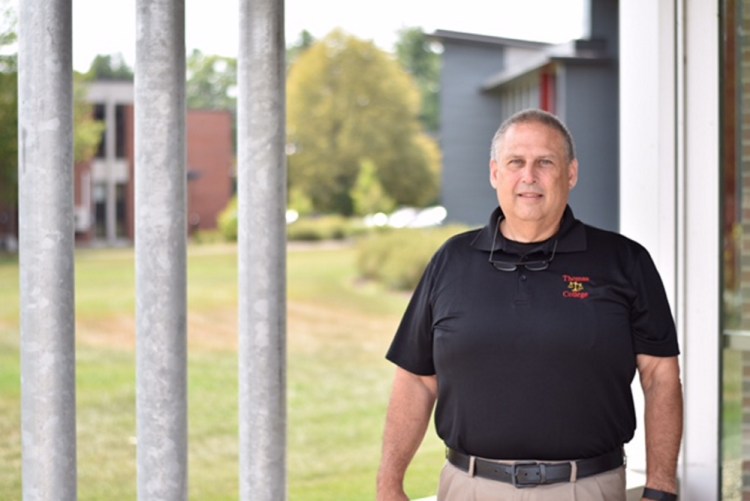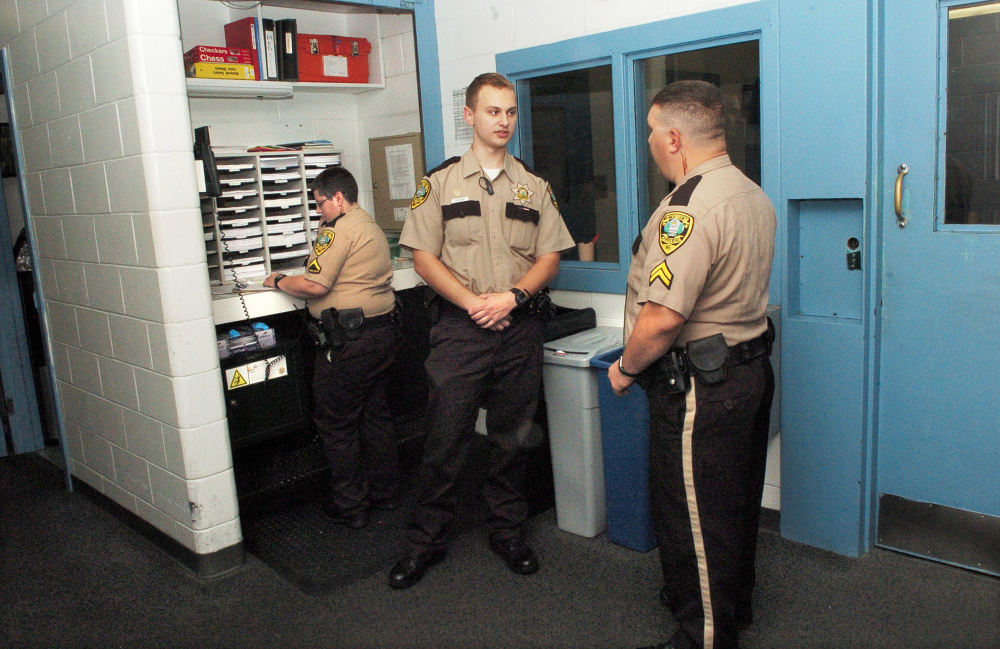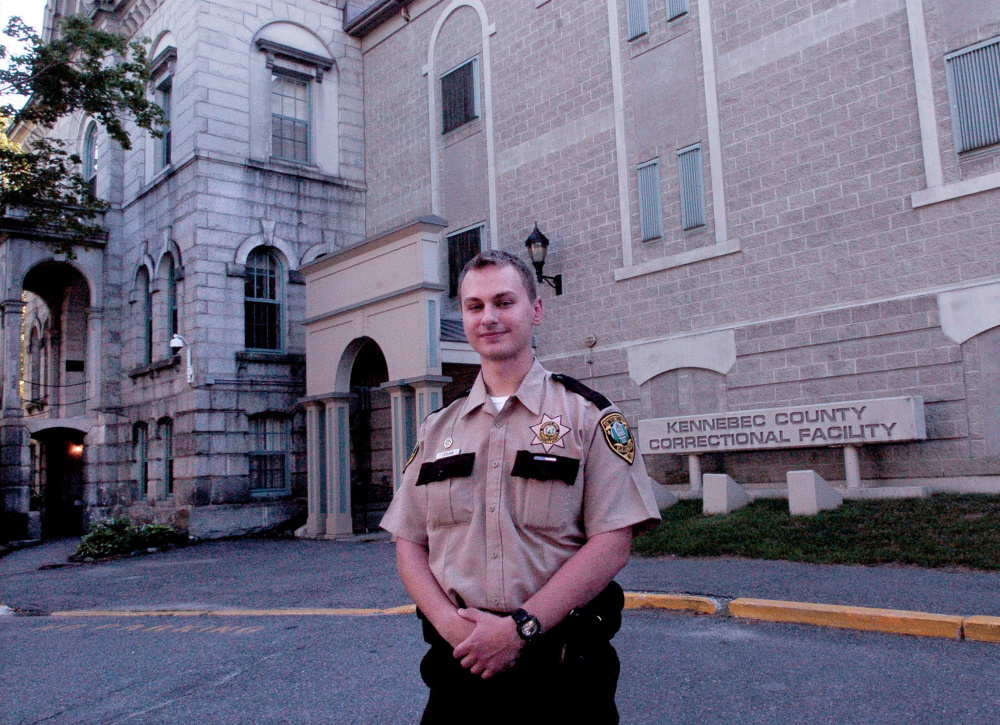WATERVILLE — Thomas College instructor Steven Dyer, who’s been teaching criminal justice for six years, decided last year it was time to change his source material.
Dyer, a former police officer, made changes to how he taught Multicultural Issues in Criminal Justice, as well as his other courses, following the shooting of 18-year-old Michael Brown in Ferguson, Missouri, in 2014. Brown, who was black, was unarmed the night he was shot by white police Officer Darren Wilson. The killing spurred Black Lives Matter protests around the country, seen by many as an example of the systemic racism within law enforcement, and protests have continued with more police shootings of unarmed minorities.
Shootings of police officers have also spurred protests, intensifying the nationwide debate on law enforcement, race and guns.
Dyer is exposing his students to a wide range of cultures, ideologies and viewpoints, an “empathy-based” approach that he hopes will prepare them for the diverse world they’ll face if they choose to work in the criminal justice system.
“My hope is that they wouldn’t overreact in a situation where they’re confronted,” he said. “How they feel isn’t important. How they react is important.”
But so far he’s in a minority. Other law enforcement officers and those involved in criminal justice education in Maine say that the answer to current problems in law enforcement are simpler, and that empathy for other points of view won’t help.
At the Maine Criminal Justice Academy in Vassalboro, officers take a class in cultural diversity and bias-based policing, said Director John Rogers.
“We train officers here to treat everybody the same,” he said about the academy. “It’s that simple.”
The Criminal Justice Academy’s board believes that’s the “only fair and equitable way” to train law enforcement officers, because they will go back to different communities, Rogers said.
Thomas College criminal justice majors can attend the 18-week Basic Law Enforcement Course at the Vassalboro academy during their senior year. It’s the same course all the state’s certified law enforcement officers take.
While Rodgers wouldn’t directly comment on other criminal justice classes or training methods, he did say that “there’s a lot of things going on at colleges that I agree with and a lot of things I disagree with.”
Eugene O’Donnell, a lecturer at the John Jay College of Criminal Justice in New York City, said in an interview Thursday that criminal justice education has become an “empathy-fest” that isn’t helpful to poor communities with high murder rates. Schools must be more solution-oriented and encourage students to go into public service, he said.
“Anyone who thinks the police are enemy number one in urban America has no clue,” O’Donnell, a former New York City police officer, said.
He said that critiques “do nothing” and that students instead need more “roadmaps.”
“We need learning to go on, and learning is uncomfortable,” he said.
At Husson University in Bangor, on the other hand, students are encouraged to open their minds to other viewpoints.
Criminal justice students are required to take a foreign culture and conversation course, which teaches a foreign language along with its culture, said John Michaud, director of the School of Legal Studies and an assistant professor.
The school also offers ethics classes to discuss the “huge amount of discretion” that officers have and how they have to use it without a bias. In an interview class, students are taught how to approach different people differently and prepare themselves for a reaction based on a person’s background.
“You need to get to know the people (in your community) and understand that they may react differently to law enforcement,” Michaud said.
The major’s capstone course also requires students to design an argument around a timely viewpoint. Michaud said he tries to assign students viewpoints he knows they don’t already agree with.
BY THE BOOK
In Oakland, police Sgt. Tracy Frost, who’s spent 22 years in law enforcement, said he’s seen the focus shift away from officers trying to “arrest their way out” of incidents over the past decade.
“I don’t believe you compromise an officer’s safety if you take a few extra minutes to talk to somebody, as opposed to arresting your way out of something,” he said.
Frost is a school resource officer, and he recently talked with other school officers from the Lewiston and Auburn area, where they were having issues with theft in schools. Children who are refugees would empty the salad bar into their bags, he said, or take an iPod that was sitting on a table.
“These kids weren’t stealing stuff because they wanted to,” Frost said. “They weren’t used to being in an environment where they were guaranteed a meal three times a day.”
Instead of arresting the children, the police sat them down and explained to them that the school wouldn’t let them go hungry, so there wasn’t a need to steal.
“If you’ve got juvenile issues, there’s probably a reason for that,” he said. As a school resource officer, Frost keeps close tabs on the children at the school he covers. He knows how their home life is and what their grades are, he said.
Recently, a girl stole mascara to “make herself feel better,” Frost said. She’d never had mascara before in her life. Frost got her connected to social services instead of arresting her and putting her in jail “where she truly doesn’t belong.”
“If you take five minutes to look at a crime, you’ll understand why it’s happening,” he said.
Dyer has been teaching at Thomas College in Waterville since 2010 and is now a full-time instructor. He previously worked as a police officer — 10 years as a public officer in Rockland and Dover and then 15 years as a private officer.
He changed classroom textbooks, switching from an academic title that he didn’t think prepared students for real life, to one called “The Color of Justice: Race, Ethnicity and Crime in America” by Samuel Walker, Cassia Spohn and Miriam DeLone. The authors of the book state their biases, which are liberal, Dyer said, which is one of the most important things. It also looks at the criminal justice system as an entity that doesn’t exist without public approval.
“How do we enforce laws and keep the public on our side at the same time?” Dyer said. It’s a delicate balance, he said.
This coming semester, he’s bringing in an additional textbook with a more conservative viewpoint: “The War on Cops” by Heather MacDonald, who says that while some police are racist, it’s not a systemic issue, Dyer said.
“It provides a great overview when you have both sides,” he said. “It gets students to talk and make their own decisions.”
Both books use the same data, he said, but interpret them in different ways.
“If you don’t have educators doing all sides, students are getting a bias,” he said. It’s “inevitable” that students are going to choose one worldview, but the goal, according to Dyer, is to give them enough information so that their decision is well-informed.
This gives students a broader understanding of the world, he said, and thus a broader understanding of “what’s expected of them as criminal justice professionals and citizens.”
“The best thing you could do (for your grade) is tell me that I’m wrong,” Dyer said.
‘COMMUNICATION MATTERS’
Dyer’s Multicultural Issues course focuses on what is happening in the news.
Before 2010, he said he focused on the Occupy Wall Street movement, when distrust of law enforcement began to take off, he said. During a phone interview on Thursday, he said he was just adding the recent violence in Louisiana and Minnesota to his lesson plans so his students could discuss what had happened.
Dyer said he hopes that by having his students read and listen to different views on the criminal justice system, like the Black Lives Matter movement, they’ll be able to understand and empathize with the people they encounter. Even if they don’t agree with a Black Lives Matter protest, they could still respect the protesters and their right to protest if working the event as a law enforcement officer.
“Communication matters,” he said.
Besides using opposing texts, Dyer centers this course on debates. He assigns the viewpoints to the students so they’re often forced to research arguments with which they disagree. Sometimes students will even change their own points of view, he said.
“If you can create that commonality between the sides, that’s where we can really move forward,” Dyer said. Empathy and open dialogue, he said, are key to moving society forward.
The class delves into the “raw issues” that society is dealing with, more so than other classes do, said Tyler LeClair, a double major in criminal justice and forensic psychology and one of Dyer’s students.
LeClair, 20, is interning at the Kennebec County jail for the summer as a corrections officer. He’s put some of Dyer’s teaching to practice at his job.
“If you listen, you’ll go miles further than if you just are an authority figure,” he said. “One of the greatest tools you can use is your ears before your mouth.”
LeClair will have small conversations during work when he’s going around to check on inmates. On a daily basis, he said, he’ll be surprised when a co-worker tells him an inmate he just talked with was arrested for a serious crime.
When he starts to learn some of the background about the inmates, he said he can “see what some of these inmates are going through mentally.” Using his knowledge of criminology, LeClair can gauge how future interactions with some people in the jail might go.
Long-time workers, though, he said, tend to see things as more black and white because they didn’t have this kind of training.
“The new generation … (see) much more than that and it should be a more effective grasp,” LeClair said. “We need to kind of adapt to what our society is becoming.”
Michaud, the Husson professor, agrees. “In order to be fair and equitable, there needs to be some understanding. You have police officers making decisions in seconds. Hopefully his or her education and experience helped him or her.”
Madeline St. Amour – 861-9239
mstamour@centralmaine.com
Twitter: @madelinestamour
Send questions/comments to the editors.





